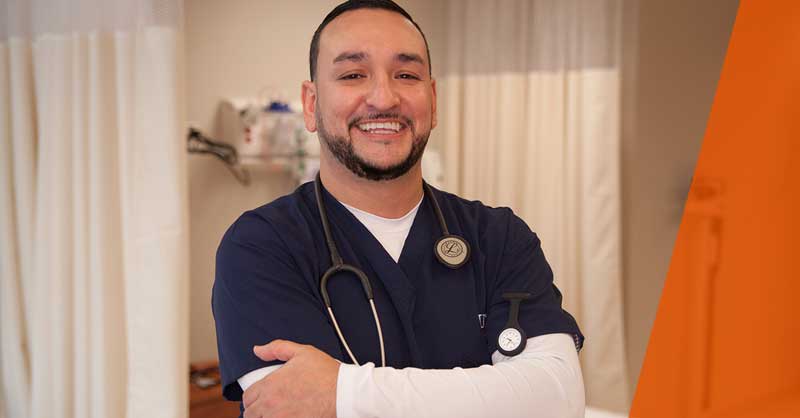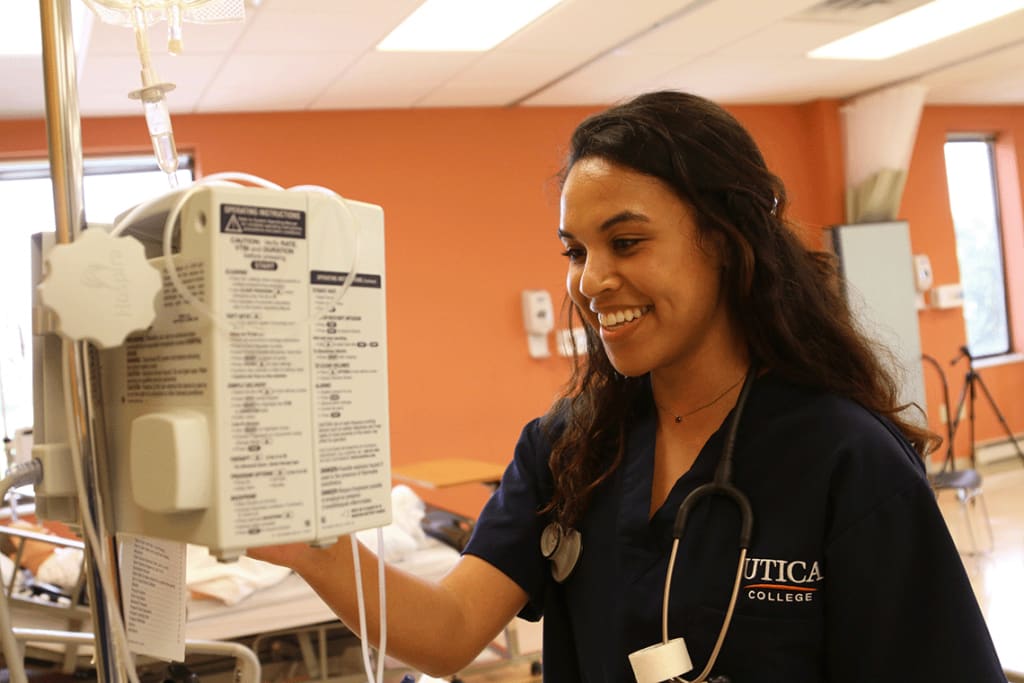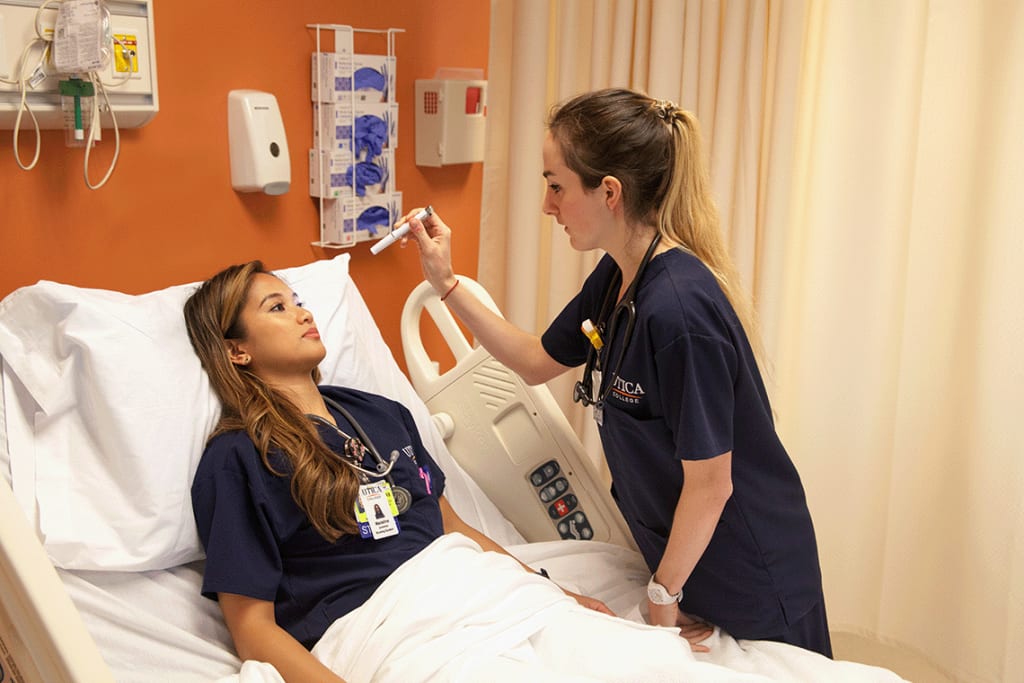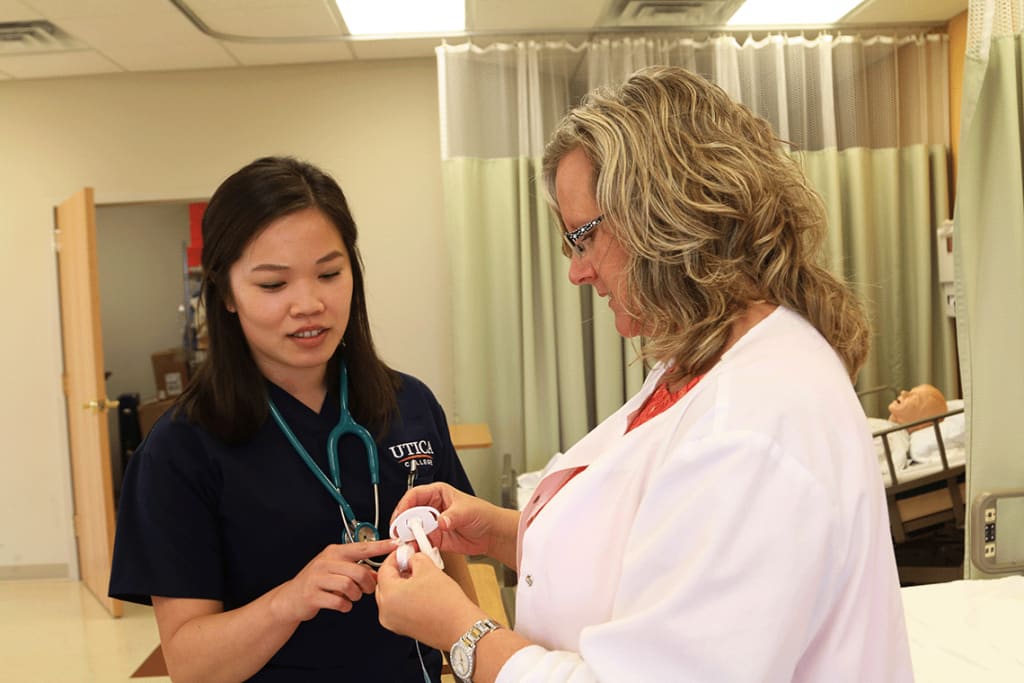What to Expect in Nursing Clinicals
Each blog post is dated and contains accurate information as of that date. Certain information may have changed since the blog post publication date. If you would like to confirm the current accuracy of blog information, please visit our ABSN program overview page or contact us at (866) 892-6747.
During nursing clinicals, students put what they’ve learned through their nursing coursework into action under the guidance of an experienced clinical instructor. During ABSN clinicals, you’ll work in multiple practice areas spanning pediatrics, adult health, acute care and mental health. These experiences will teach you to interact with patients effectively.

If you’re wondering what to expect in nursing clinicals, let us give you some insight. The clinical portion of Utica University’s Accelerated Bachelor of Science in Nursing (ABSN) program exposes you to a diverse range of practice areas and empowers you to put the information you’ve learned during your nursing courses into action under the guidance of our knowledgeable clinical instructors.

Wondering what to expect from nursing school? Here’s a glimpse of what nursing school is like.
What Are Clinicals in Nursing?
Nursing clinicals are the cornerstone of your learning experience as a nursing school student. They build upon your coursework and simulation lab experience while allowing you to develop your nursing skills in a variety of patient care scenarios.
And if there’s one thing we know about nursing, it’s this: you have to be ready for just about anything. That’s why we at Utica University take the extra effort to ensure our ABSN students experience as many types of situations during their nursing school clinicals as possible.
Clinicals at Utica University
Whether it’s exposure to diverse demographic settings or wide-ranging specialty areas, learn how varied clinical rotations through the ABSN program at Utica University (formerly Utica College) set you up for success for your nursing career.

You’ll complete clinicals at Utica in person, practicing many nursing skills, including:
- Interacting with patients
- Taking vitals
- Inserting a catheter
- Caring for wounds
- Assessing patients
- Administering medication
Additionally, our clinical partnerships with healthcare facilities in the Syracuse/Liverpool and Albany areas of New York will let you treat diverse patient groups and expand your care experiences. While we cannot guarantee when or where your clinical rotations will occur, our students generally complete their practice hours in a variety of healthcare settings and practice areas.
What Do Nursing Students Do in Clinicals?
As an ABSN student at Utica University, you will complete 588 hours of clinical practice at various first-rate healthcare facilities near the Syracuse and Albany metro areas.

Thinking of moving to New York for nursing school? Here are six things to expect when relocating for nursing school.
Your nursing clinicals will begin during your first semester, as early as six weeks into the program. These early experiential learning opportunities set you up for a successful nursing career down the line.
Specialty Areas
The sites where our ABSN students complete their clinicals have solid reputations in their respective communities and boast staffs with expert medical knowledge in an array of patient care specialties.
As a Utica University ABSN student, you’ll learn to practice safe, ethical and competent patient care with supervision from a licensed clinical instructor. Your clinicals could take place in any of the following areas:
- Acute care
- Adult health
- Intensive care
- Long-term care
- Mental health
- Obstetrics
- Pediatrics
- Public and community health
Clinicals Let You Try Different Specialties
By completing nursing school clinicals in a variety of specialty areas, you get to “try on” different career paths in nursing to find the right fit for you.
Imagine having the ability to test out different work environments before applying for a job at any of them. As a Utica University ABSN student, you’ll have unprecedented real-world learning experiences in top-notch facilities of all sizes and demographic areas.
For one clinical rotation, you could be in a slower-paced, suburban nursing home, while the next could take place on the medical-surgical floor of a busy metropolitan hospital.
These clinical experiences develop your skills while also helping you decide what type of nurse you’d like to be in the future. And who knows? You might end up surprising yourself. Maybe you start your nursing education wanting to work in the emergency room but end up loving pediatrics.

Patient Care Scenarios
Because clinicals start the first semester, you will have many chances to practice the nursing skills you will have learned in skills labs. Don’t worry, though; we won’t throw you into the deep end on the first day.
You’ll likely start your rotations observing nurses, completing basic patient care tasks, charting, and talking to patients. You could transition into more advanced tasks like arterial line maintenance and ventilator management as your education progresses.
How Clinicals Connect with Coursework
While reading about the circulatory system or practicing dressing a wound on a manikin are valuable building blocks for your education, having the chance to apply your skills and knowledge in caring for real patients is a whole other ball game.
That’s what makes clinical rotations so valuable. Putting your education into practice in various healthcare settings helps you gain confidence collaborating with others in interdisciplinary patient care situations and understanding why nurses do things a certain way.
Instructor Styles and Relationships
During your clinical rotations, you’ll spend several hours with clinical instructors, staff nurses and fellow nursing students. While most clinicals have an 8:1 student-to-instructor ratio, sometimes the ratio is 4:1 or 6:1 for specialties, ensuring you receive personalized education in a real-world healthcare setting.
Before each clinical shift, you’ll meet with your instructor and fellow members of your cohort to set goals for the day, and then you’ll reconvene at the end of the day to debrief.
During the fourth semester, you can expect to shadow and assist a staff nurse for your transitional, or capstone, experience. This opportunity gives you in-depth exposure to the day-to-day intricacies involved in today’s complex healthcare environment.

How Your Clinical Instructors Shape You
Exposure to several clinical instructors throughout the ABSN program is just another way our nursing school clinicals ready you for the real world. During your clinical rotations, you’ll learn how to work well with co-workers and supervisors of all personality types.
But no matter who you work with during your rotations, you can expect your clinical instructor to be 100% committed to your success.
Your Future Starts Now
With our 16-month program starting three times per year, you have your choice of when to begin your accelerated nursing school journey. It could begin sooner than you might think.
Start by contacting our admission representatives. They’ll share more information about when you can start, what to expect from nursing school clinicals and how clinicals tie into the rest of our program.

